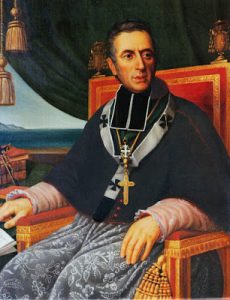HOMILY WEEK 07 02 – Year II
Humble, Childlike, Trusting Faith:
Optional Memorial of St. Eugene de Mazenod
(James 4:1-10; Ps 55; Mk 9:30-37)
**************************************
“Humble yourself before the Lord, and he will exalt you.”
This admonition from St. James in the first reading is the key to understanding the readings of today’s liturgy, and a strong invitation for us to pray for a humble, childlike, trusting faith in Jesus.
In the gospel, Jesus, the Word made flesh, the Son of God through whom all things were made (Colossians 1:16), is the ultimate expression of this message about being humble, as he strives to prepare his disciples for the suffering and agonizing death that awaits him. There cannot be, and is, no greater humility than that.
Upon their arrival in Capernaum, we find out his disciples were nowhere near understanding that teaching. In fact, they were on the opposite extreme of the spectrum, caught up in the way of the world – arguing about who would be the greatest, still craving the false gods of possessions, prestige, power and pleasure. Jesus has to take a little child, identify himself with that child, and stress they must all become like that little child, to learn to humbly serve, if they want to truly be part of following him.
Bishop Robert Barron questions how so? and provides an answer: Children don’t know how to hide the truth of their reactions. They haven’t learned yet how to impress others. In this, they are like stars or flowers or animals, things that are what they are, unambiguously. They are in accord with God’s deepest intentions for them.
Children haven’t yet learned how to look at themselves. Why can a child immerse himself so eagerly and thoroughly in what he is doing? Because he can lose himself; because he is not looking at himself, conscious of the reactions, expectations, and approval of those around him.
The problem is that, from a very early age, we learn not to be ourselves, and this is a function of the sinful human construct of the ego. We convince ourselves that joy will come only when we become like someone else, only when we receive the applause of the crowd, only when we live up to the expectations of our group, family, or society. This causes that terrible cramping of the soul which is pride, the deadliest of the deadly sins.
The Letter of James goes on to articulate the very things Jesus is cautioning about – an inner attitude of desire and greed that leads to outer hurtful actions: inner cravings lead to conflicts and disputes; inner desire leads even to murder, and inner covetousness, he repeats, leads to disputes and conflicts. Even our prayer becomes ineffective when we are praying for the wrong things, to satisfy our own pleasure rather than to fulfill the will of God.
James then provides us with a beacon of hope in this rather dark and stark situation. We can be humble, submit ourselves to God, and come to God for forgiveness (cleansing) and healing (purification). That is the role of Jesus as the Messiah – to forgive and to heal, to redeem and to sanctify. All we need is humble willingness and that precious gift is ours to enjoy.
 Keith Hoang, author of Built For Greatness, a Christian version of the ancient Tao Te Ching which I revised, asked me to write a commentary for a Christian version of this book of ancient wisdom. In so doing, I discovered a sort of divine irony in the light of today’s gospel. Whereas the disciples, who have been with Jesus some time now, were still caught up with the world’s values of possessions, prestige, power and pleasure, five hundred years earlier, a Chinese sage Lao Tzu, building on the concept of the Tao that had been an integral part of Chinese culture for thousands of years, already understood and was teaching this wisdom in a way hauntingly similar to Jesus. Here is an example:
Keith Hoang, author of Built For Greatness, a Christian version of the ancient Tao Te Ching which I revised, asked me to write a commentary for a Christian version of this book of ancient wisdom. In so doing, I discovered a sort of divine irony in the light of today’s gospel. Whereas the disciples, who have been with Jesus some time now, were still caught up with the world’s values of possessions, prestige, power and pleasure, five hundred years earlier, a Chinese sage Lao Tzu, building on the concept of the Tao that had been an integral part of Chinese culture for thousands of years, already understood and was teaching this wisdom in a way hauntingly similar to Jesus. Here is an example:
“Therefore, the honoured use the lowly as basis, the higher uses the lower as foundation. Thus, the rulers call themselves alone, bereft, and unworthy. Is this not using the lowly as basis? Is it not so? Therefore, the ultimate honor is no honor. Do not wish to be shiny like jade. Be dull like rocks. (Chapter 39).
In his Christian version of the same chapter, Keith rendered this wisdom as follows: “Humility is the root of honour. The high is built upon the foundation of the low. Thus, true rulers call themselves alone and unworthy. Don’t they depend on being humble and low? Absolutely! Therefore, seeking praise does not win true praise. Do not adorn yourself with sparkling jade, but be common and dull as the rocks.”
The scripture passages Keith chose to go along with this portion of the Tao Te Ching are Luke 14:10-11 (“When invited, sit down at the lowest place”) and Matthew 25:5-7 (“They do all their deeds to be seen by others”). These gospel teachings affirm and give credibility to the wisdom of the Chinese sages, and the Christian version of the Tao Te Ching then fulfills that teaching and opens it up to a deeper and broader perspective of God as Father, Son and Holy Spirit at work throughout all human endeavour over the ages, slowly leading us to the fullness of eternal life with God.
Today the church invites us to honour St. Eugene de Mazenod, founder of the religious congregation to which I belong. Charles Joseph Eugene was born in France in 1782, the only child of wealthy parents. When he was nine years old, the poor and oppressed people of France rose up against the rich aristocracy in the French Revolution. His noble family fled to Italy where they were refugees for eleven years, often in poverty. Finally, his parents separated. Eugene stayed with his father in Italy while his mother returned to France. During this time, however, seeds of a religious vocation were planted in him by a saintly priest, and he was ordained in 1811.

St Eugene de Mazenod
Having learned Provençal from his family’s servants, he was drawn to minister to the poor and the young. Realizing the need for popular missions to reach out to the poor and marginalized, Eugène founded a missionary institute of priests and lay brothers in 1826, the Missionary Oblates of Mary Immaculate, whose particular charism was to evangelize the poor and those who have never heard of Christ. By the middle of the 19th century, in response to requests for help from Bishop Ignace Bourget of Montreal, Eugene daringly sent several of its small number to Canada. Within 10 years of their arrival, the Oblates had covered all of Canada and expanded into the United States. All of the dioceses in Western and Northern Canada were started by Oblates except Victoria and Nelson.
Eugene became bishop of Marseilles in 1837 and reorganized the diocese, accomplishing great works. A fervent supporter of the papacy in matters of education and infallibility, he continued as superior of the Oblates until his death on May 21, 1861. Eugene was canonized on December 3, 1995. Today, the members of this community minister around the world in remote missions and in education. In Canada, the Oblates established the College of Bytown (which became the University of Ottawa and St. Paul University) and Novalis, as well as numerous parishes and dioceses from coast to coast.
Eugene had a special devotion to the Blessed Virgin Mary, and deep faith in the presence of Jesus in the Blessed Sacrament, before which he felt united with his Oblates around the world during his daily oraison. The Eucharist is in itself a new song – a song of deep faith in the presence of the Risen Lord among us through both Word and Sacrament.
The Eucharist is itself a very humble, faith-filled meal, offering us that forgiveness and healing James mentions, and empowering us to take to heart this humble, childlike trusting faith that leads to the fullness of life.



